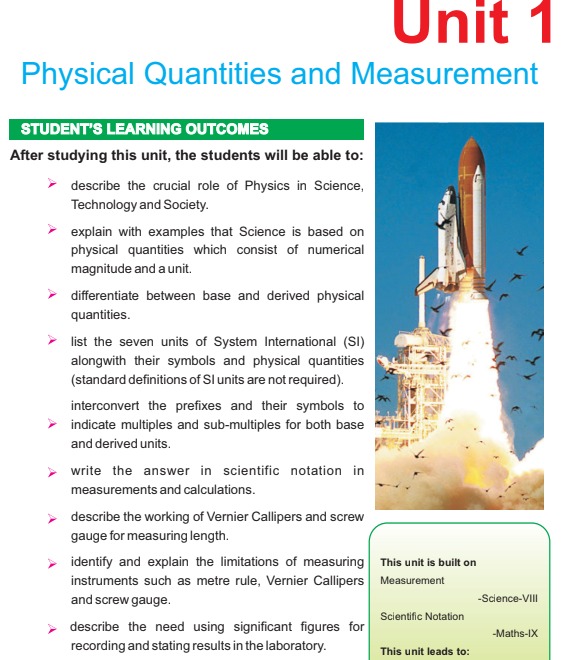Physical Quantities and Measurement
This chapter covers several key topics, including:
The Role of Physics: class 9 physics notes chapter 1 Physics drives advancements in science, technology, and society. Therefore, understanding its role is essential.
Physical Quantities: We explore the importance of numerical values and units in scientific measurements. Consequently, these elements enable accurate data interpretation.

Base and Derived Quantities: We differentiate between fundamental physical quantities and their derived counterparts. Thus, clarity in definitions enhances comprehension.
SI Units:
Class 9 physics notes chapter 1 it involves understanding how much of something, like milk or sugar, we need. Therefore, we need standard quantities to measure and compare unknown amounts. Once a standard for a quantity is established, we can express other quantities in relation to that standard. This standard is known as a unit.
We list the seven standard units of the International System of Units (SI) along with their symbols. This provides a consistent framework for measurement.
Prefixes for Units: We interconvert prefixes that indicate multiples and sub-multiples for both base and derived units. As a result, we enhance our measurement accuracy.
Scientific Notation: We apply scientific notation in measurements and calculations for clarity. Hence, this method simplifies complex numbers.
Measuring Instruments: We describe how Vernier calipers and screw gauges work for precise length measurements. Consequently, these tools improve measurement accuracy.
Limitations of Instruments: We identify the limitations of measuring tools like the metre rule, Vernier calipers, and screw gauges. Therefore, recognizing these limitations is crucial for reliable results.
Significant Figures: We explain the importance of significant figures for accurate recording and reporting of results in laboratory settings. Thus, they play a vital role in scientific integrity.
Physical Quantities:
All measurable quantities are known as physical quantities, such as length, mass, time, and temperature. Each physical quantity has two key characteristics: its numerical value and the unit in which it is measured. For example, when we say a student’s height is 104 cm, the “104” is the numerical value, and “centimeter” is the unit of measurement.
Similarly, if a grocer mentions that a bag contains 5 kg of sugar, he is providing both the numerical value (5) and the unit (kg). Without both, such as just saying “5” or “kg,” the information would be incomplete and confusing.
Furthermore, physical quantities are categorized into two types: base quantities and derived quantities. This distinction helps us understand how different measurements relate to each other.
INTERNATIONAL SYSTEM OF UNITS
Class 9 physics notes chapter 1 it involves understanding how much of something, like milk or sugar, we need. Therefore, we need standard quantities to measure and compare unknown amounts. Once a standard for a quantity is established, we can express other quantities in relation to that standard. This standard is known as a unit.
Moreover, as science and technology advanced, the need for a common system of units became increasingly important, especially for sharing scientific and technical information globally. Consequently, in 1960, the eleventh General Conference on Weights and Measures held in Paris introduced a worldwide system of measurements called the International System of Units, commonly referred to as SI.
People also looking for CHEMISTRY

